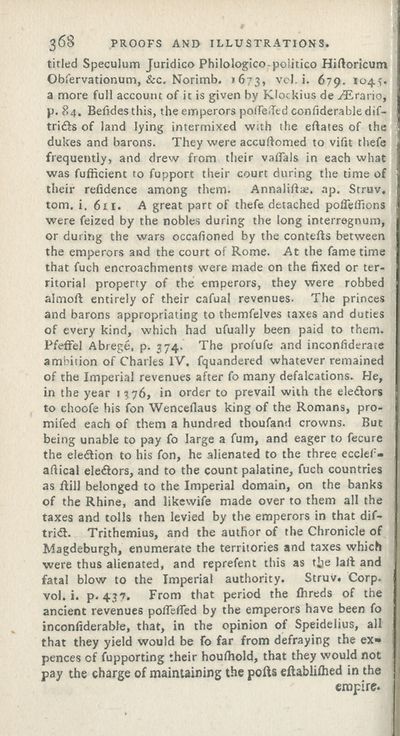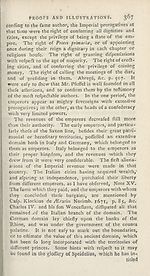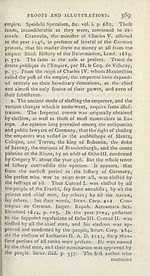Download files
Complete book:
Individual page:
Thumbnail gallery: Grid view | List view

368 PROOFS AND ILLUSTRATIONS.
titled Speculum Juridico Philologico-politico Hiftoricum
Obfervationum, &c. Norimb. i6’3, vcl. i. 679. 1041.
a more full account of it is given by Klockius de ^Erano,
p. 84. Betides this, the emperors polfe.Ttd confiderable dif-
trifts of land lying intermixed with the eftates of the
dukes and barons. They were accuftomed to vitit thefe
frequently, and drew from their valfals in each what
was fufficient to fupport their court during the time of
their refidence among them. Annalitia;. ap. Srruv,
tom. i, 6l I. A great part of thefe detached potTetrions
were feized by the nobles during the long interregnum,
or during the wars occafioned by the conttfts between
the emperors and the court of Rome. At the fame time
that fuch encroachments were made on the fixed or ter¬
ritorial property of the emperors, they were robbed
almoft entirely of their cafual revenues. The princes
and barons appropriating to themfelves taxes and duties
of every kind, which had ufually been paid to them.
Pfeffel Abrege, p. 374. The profufe and inconfiderate
ambition of Charles IV. fquandered whatever remained
of the Imperial revenues after fo many defalcations. He,
in the year 1376, in order to prevail with the electors
to choofe his fon Wenceflaus king of the Romans, pro-
mifed each of them a hundred thoufand crowns. But
being unable to pay fo large a fum, and eager to fecure
the eletSion to his fon, he alienated to the three ecclef-
afiical ele&ors, and to the count palatine, fuch countries
as ftill belonged to the Imperial domain, on the banks
of the Rhine, and likewife made over to them all the
taxes and tolls then levied by the emperors in that dif-
tri<S. Trithemius, and the author of the Chronicle of
Magdeburgh, enumerate the territories and taxes which
were thus alienated, and reprefent this as tjje lalt and
fatal blow to the Imperial authority. Struv. Corp.
vol. i. p.437. From that period the fhreds of the
ancient revenues polTelfed by the emperors have been fo
inconfiderabfe, that, in the opinion of Speidelius, all
that they yield would be fo far from defraying the ex-
pences of fupporting their houlhold, that they would not
pay the charge of maintaining the ports eftablilhed in the
empire.
titled Speculum Juridico Philologico-politico Hiftoricum
Obfervationum, &c. Norimb. i6’3, vcl. i. 679. 1041.
a more full account of it is given by Klockius de ^Erano,
p. 84. Betides this, the emperors polfe.Ttd confiderable dif-
trifts of land lying intermixed with the eftates of the
dukes and barons. They were accuftomed to vitit thefe
frequently, and drew from their valfals in each what
was fufficient to fupport their court during the time of
their refidence among them. Annalitia;. ap. Srruv,
tom. i, 6l I. A great part of thefe detached potTetrions
were feized by the nobles during the long interregnum,
or during the wars occafioned by the conttfts between
the emperors and the court of Rome. At the fame time
that fuch encroachments were made on the fixed or ter¬
ritorial property of the emperors, they were robbed
almoft entirely of their cafual revenues. The princes
and barons appropriating to themfelves taxes and duties
of every kind, which had ufually been paid to them.
Pfeffel Abrege, p. 374. The profufe and inconfiderate
ambition of Charles IV. fquandered whatever remained
of the Imperial revenues after fo many defalcations. He,
in the year 1376, in order to prevail with the electors
to choofe his fon Wenceflaus king of the Romans, pro-
mifed each of them a hundred thoufand crowns. But
being unable to pay fo large a fum, and eager to fecure
the eletSion to his fon, he alienated to the three ecclef-
afiical ele&ors, and to the count palatine, fuch countries
as ftill belonged to the Imperial domain, on the banks
of the Rhine, and likewife made over to them all the
taxes and tolls then levied by the emperors in that dif-
tri<S. Trithemius, and the author of the Chronicle of
Magdeburgh, enumerate the territories and taxes which
were thus alienated, and reprefent this as tjje lalt and
fatal blow to the Imperial authority. Struv. Corp.
vol. i. p.437. From that period the fhreds of the
ancient revenues polTelfed by the emperors have been fo
inconfiderabfe, that, in the opinion of Speidelius, all
that they yield would be fo far from defraying the ex-
pences of fupporting their houlhold, that they would not
pay the charge of maintaining the ports eftablilhed in the
empire.
Set display mode to:
![]() Universal Viewer |
Universal Viewer | ![]() Mirador |
Large image | Transcription
Mirador |
Large image | Transcription
| Antiquarian books of Scotland > Kings & rulers > History of the reign of the Emperor Charles V. > Volume 1 > (386) |
|---|
| Permanent URL | https://digital.nls.uk/109186963 |
|---|
| Description | By William Robertson. London : Cadell and Davies, 1798. |
|---|---|
| Shelfmark | ABS.1.76.13 |
| Additional NLS resources: | |
| Description | Thousands of printed books from the Antiquarian Books of Scotland collection which dates from 1641 to the 1980s. The collection consists of 14,800 books which were published in Scotland or have a Scottish connection, e.g. through the author, printer or owner. Subjects covered include sport, education, diseases, adventure, occupations, Jacobites, politics and religion. Among the 29 languages represented are English, Gaelic, Italian, French, Russian and Swedish. |
|---|

